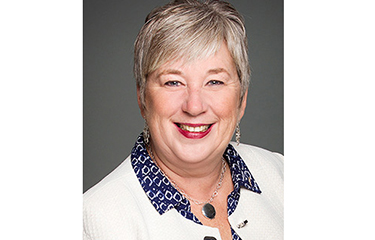Canada’s fisheries reform efforts knocked after Bernadette Jordan loses reelection bid

Canada Minister of Fisheries, Oceans, and the Canadian Coast Guard Bernadette Jordan lost her reelection bid in her local riding in Nova Scotia during the 44th Canadian general election on 20 September.
Her loss was partially blamed on controversial fisheries policies she pushed for, including a plan to shift aquaculture in British Columbia from in-ocean pens to land-based formats, as well as Fisheries and Oceans Canada’s handling of Indigenous fishing rights in Nova Scotia.
Jordan was appointed as minister in November 2019 by Canadian Prime Minister Justin Trudeau, who dissolved parliament and called for a new federal election in August. The results of the election gave Trudeau a third term as prime minister and returned his Liberal Party to Ottawa to once again head a minority government, but Jordan lost her local election in the Nova Scotia riding of South Shore–St. Margarets to Conservative Rick Perkins, according to the CBC.
Jordan’s loss marked a shift in Atlantic Canada, with the Conservative Party candidates declared winners in seven of the region’s ridings, which had previously been a Liberal stronghold. Overlayed on that political shift were the often-polarizing fisheries policies of Trudeau’s government and Jordan’s decisions as its fisheries minister.
“Honestly, the big challenge for me was, as a fisheries minister, there were some people that didn’t like the decisions I had to make in some cases and I think that was the deciding factor,” Jordan told LighthouseNOW.
Jordan inherited a number of challenges in assuming her post in 2019, including Trudeau’s plan to expand several marine protected areas to represent 30 percent of the country’s exclusive economic zone by 2030, and a Trudeau-issued mandate for her to “work with the province of British Columbia and Indigenous communities to create a responsible plan to transition from open net-pen salmon farming in coastal British Columbia waters by 2025 and begin work to introduce Canada’s first-ever Aquaculture Act.”
More difficulties arose for Jordan in 2020, with a spike in North Atlantic right whale mortalities blamed in part on the Canadian snow crab fishery and severe downturns in British Columbia’s salmon populations spurring her to close down a majority of the commercial salmon fisheries in the province earlier this year. Trudeau also leaned on Jordan to help launch its Blue Economy program.
Additionally, Jordan was in her post for the latter end of a controversy involving the country’s Arctic surf clam fishery and a separate issue involving questionable lobster-fishing practices, both involving Bedford, Nova Scotia-based Clearwater Seafoods, which was sold to Premium Brands and the Mi’kmaq First Nations in November 2020.
“Fisheries is always tough because you are the regulator and oftentimes you have to make decisions people don’t like,” Jordan told The Chronicle Herald. “That goes for everyone. Would I do something differently? That’s like how long’s a piece of string. It’s a very tough situation and I wish the next fisheries minister the best of luck.”
Fish, Food, and Allied Workers (FFAW-Unifor) President Keith Sullivan said Jordan had made “some progress on commitments made to FFAW members, including protecting the independence of inshore, owner-operator fish harvesters through the passage of amendments to the Fisheries Act that enshrined owner-operator and fleet separation policies in law.”
“However, there is much work left to be done when it comes to fair quota allocations for Newfoundland and Labrador harvesters, meaningful consultations, and consideration for social, economic, and cultural factors in fisheries management,” he said. “We are in a time of economic rebuilding and what is needed most right now is a champion for communities, not corporations, who is committed to creating opportunities for rural Newfoundland and Labrador. We look forward to the announcement of Prime Minster Trudeau’s cabinet appointments and seeking meetings as soon as possible to reiterate the priorities identified by FFAW-Unifor members.”
Two of the most-pressing issues facing Jordan’s successor will be the continued mitigation of the economic impacts of the COVID-19 pandemic on Canada’s seafood industry and the resolution of a fight between Indigenous fishermen who argue they are allowed by treaty to fish outside of standard federally regulated seasons and fishermen bound by those rules. Frustration between the two sides has resulted in bouts of violent confrontations in Nova Scotia.
“I think that’s exactly where a new minister can come into play here, is that they’d have a clear role to bring us all to the table and bring us all to a dialogue process,” Bay of Fundy Inshore Fishermen’s Association and Unified Fisheries Conservation Alliance President Colin Sproul told The Global Herald.
Sipekne’katik Chief Mike Sack, who was arrested by DFO officers in 2020 for initiating what he has called a treaty-approved fishery outside of Canadian regulations, blamed Jordan for exacerbating tensions and not resolving the issue.
“I definitely do think she had time to act and she didn’t, so hopefully the next [minister] will,” Sack told Global News. “I’m hoping that there is somebody new with an open mind and the willingness to get this resolved, as opposed to somebody being steered all over the map.
Sack called for Trudeau to choose his next fisheries minister from a province not so riven by fisheries-related conflicts.
“I strongly believe the next fisheries minister should be somebody from central Canada who is not surrounded by fishermen and fisherwomen,” Sack said. “I think that’s a better way to have an unbiased decision and you are also not going to jeopardize somebody’s career by it.”
Photo courtesy of Canada Department of Fisheries and Oceans






Share